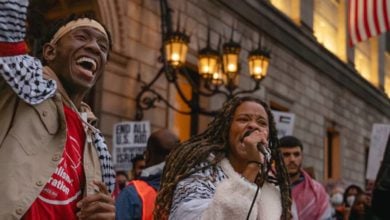Stop & Shop workers in New England, members of the United Food and Commercial Workers Union, have been on strike for nine days as of April 19. To investigate the causes and early impact of the strike, Liberation News spoke with Stop & Shop workers and customers on the picket lines of various Greater Boston Area stores, as well as strike supporters attending the “Cross the Finish Line, Not Picket Lines” solidarity rally organized by Boston Democratic Socialists of America at the Boston Marathon on April 15.
As previously reported by Liberation News, Stop & Shop is owned by Ahold Delhaize, an international conglomerate. Ahold Delhaize received $507.1 million in tax breaks over the past two years, made $44 billion in U.S. net sales and $2 billion in profits in 2018, and has paid out $5.2 billion to shareholders over the last decade (source: bit.ly/supportSSworkers).
Across the Greater Boston Area, Stop & Shop workers and their supporters critiqued the company’s priorities. At the South Bay store, two frequent customers spoke in support of the strike. Chalkey Horenstein “used to work in grocery stores a lot growing up,” and the picketers’ grievances have resonated with him. “I think a lot of the policies that Stop & Shop is doing is creating a thing where people basically have to either do two jobs or struggle without things like proper health insurance…and that’s just not a good way to treat people.”
Nathan Comstock, who accompanied Horenstein, added, “Companies need to take care of the people that work for them, and if you can’t afford to pay your employees a living wage and give them healthcare, you shouldn’t be able to afford to keep your business open.” Horenstein noted that Stop & Shop’s unwillingness to offer higher wages is a matter of priorities, not financial constraints. “Just looking at basic profit margins, it’s not like they don’t have the money.”
Former long-time UFCW member Ed Shinebarg, who spoke with Liberation News at Boston DSA’s “Cross the Finish Line, Not Picket Lines” solidarity rally echoed this sentiment. “When greed takes over and when high ranking executives — presidents and CEOs — want to keep the money for themselves, something is wrong. Labor unions should not roll over and say ‘well whatever you can give us for an increase is fine.’ The only way to send a message to some of these companies that are so greedy is to strike.”

According to UFCW Local 919, Stop & Shop has lost $20 million a day during the strike. That amounts to estimated losses totaling $120 million dollars and counting. These losses are a result of various factors. Many Stop & Shop locations are completely closed in the absence of employees to operate the stores. Customers’ refusal to cross the picket lines at stores that remain open is having a further, unquantified, effect. Finally, strikers have blocked supply deliveries to open stores with support from the International Brotherhood of Teamsters. IBT drivers typically make deliveries to Stop & Shop, but are refusing to cross the picket lines. This has resulted in sparse shelves and rotting produce.
While challenging an international conglomerate is a daunting task, the early impacts of the strike have given the strikers cause for optimism. Workers on the picket lines have expressed unwavering determination because they view their entire livelihoods as on the line. Jayne Courier, an employee of the Freeport Street Stop & Shop who went to picket at the South Bay store summarized what a victory would mean for herself, her coworkers and their families: “We wouldn’t have to be concerned about our healthcare… When you’re thinking about losing 25 percent of your wages to pay for your healthcare benefits that you’ve been receiving all along because you’ve earned it…it’s just not fair. The big thing for myself is the healthcare and of course pension… And then wages. People need to get a fair wage for the hard work.”
Entering the second week of their strike, the workers and their union representatives are gearing up for a long struggle to secure these protections. Bob Berman, a business agent from UFCW Local 1445, promised that the union will stand its ground: “We’re here for the win. We’re in here for the long haul.”
Follow Liberation News for ongoing coverage of the strike.





